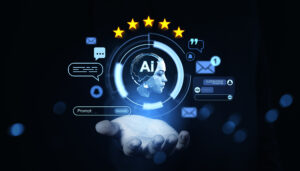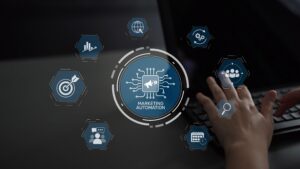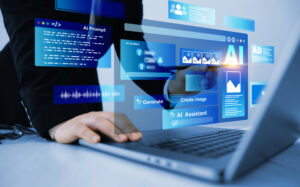How can you future-proof your career in an era dominated by AI in the workplace? What human skills will remain essential as AI in the workplace becomes more advanced? Are you prepared to work alongside intelligent systems in a rapidly evolving environment with AI in the workplace?
As AI in the workplace becomes a staple across industries, it’s not enough to simply fear automation—it’s time to adapt. This blog explores the growing need for future-ready skills that will empower professionals to thrive alongside intelligent systems. From critical thinking and emotional intelligence to AI literacy and cybersecurity awareness, the piece highlights the capabilities that machines can’t replicate and the human traits that remain indispensable.
The article also emphasizes the importance of lifelong learning, ethical AI use, and digital adaptability in a tech-driven future. Rather than viewing AI in the workplace as a threat, it positions AI as a catalyst for personal growth, innovation, and deeper collaboration, offering a blueprint for staying relevant and indispensable in the next wave of workforce transformation.
A few years ago, artificial intelligence felt like a distant future, something for tech labs and sci-fi movies. Today, it’s embedded in our workflows, shaping how we communicate, make decisions, and get work done. AI is no longer just a tool. It’s a teammate, co-creator, and impressive force transforming how we exist in the workplace.
It’s no surprise that conversations around AI often swing toward fear: Will AI replace me? Will my job still exist in five years? These are valid concerns, especially in a world where automation is eliminating certain roles at a rapid pace. But here’s what’s also true, and rarely highlighted enough: AI is also creating entirely new kinds of jobs, industries, and opportunities. According to the World Economic Forum, AI is set to create millions of new jobs, with demand rising for professionals who can train, explain, and sustain intelligent systems.
So, the real question isn’t, “Will AI take my job?” but “Am I ready to work alongside AI?”
Whether you’re a data scientist or working in an entirely different industry, AI in the workplace is becoming a standard feature across almost all workflows to some degree.
The future of work will be defined not by machines replacing humans but by how humans evolve in response, how we embrace our distinctly human skills, and how we partner with technology to solve bigger, more meaningful challenges.
Here’s a look at the essential future skills that will help you stay relevant and become indispensable in an AI-enhanced workplace.
Table of Contents:
Digital & Technological Competencies
Interpersonal & Emotional Skills
Lifelong Learning & Self-Management
Core Cognitive Skills
As AI in the workplace becomes more common across industries and data and automation become prevalent forces, core cognitive skills like critical thinking are becoming a superpower. AI can deliver insights, but only humans can evaluate them with context, values, and empathy. That’s the human touch you often hear people talking about when discussing whether AI is fully replacing humans. Those are the characteristics that these algorithms, as advanced as they may be, can’t replicate.
These core cognitive skills are becoming essential in future AI-enhanced workplaces:
- Critical Thinking & Problem Solving
- Data Literacy
1. Critical Thinking & Problem Solving
Analyzing information, questioning assumptions, and thinking strategically is essential to interpreting AI-generated data and making informed decisions. When AI presents patterns or anomalies, it takes a human mind to interpret what matters and what to do next. Critical thinkers will be the bridge between raw data and meaningful action.
2. Data Literacy
In many fields, we’re often surrounded by dashboards, reports, and data visualizations. But data literacy isn’t just about reading charts. It’s about asking the right questions, understanding where the data came from, recognizing bias, and making smart, informed decisions based on it. Importantly, knowing AI’s limits (what it can and can’t tell us) and its potential for bias is a part of responsible decision-making.
Digital & Technological Competencies
According to McKinsey research, 92% of companies plan to increase their investments in AI over the next three years, further underscoring the importance of developing these skills.
With AI in the workplace, being digitally savvy is no longer optional, or just nice to have; it’s foundational. These are just a few of the digital and technological competencies that are worth mastering:
- AI Literacy
- Digital Adaptability
- Cybersecurity Awareness
1. AI Literacy
A basic understanding of how AI works and its applications is becoming vital. You don’t need to be a coder, but you do need to understand how AI makes decisions, what types of problems it can solve, and where it tends to falter. This includes understanding key concepts like machine learning, algorithms, and bias. Again, you don’t need to be an expert. You just need to have a basic enough understanding to interact with the tools effectively.
2. Digital Adaptability
Being adaptable is always a vital skill in the workplace, particularly regarding new tech. It’s good to be open to learning about and adopting new digital tools and platforms. New platforms are constantly emerging, though. Instead of mastering one, focus on building adaptability to get comfortable experimenting with new digital environments, always staying open to change.
3. Cybersecurity Awareness
With great tech comes great responsibility. As automation increases, so do digital vulnerabilities. Everyone, not just the IT team, needs to understand safe practices: protecting data, recognizing phishing threats, and responsibly managing access and permissions. As AI in the workplace continues evolving and spreading across industries, understanding safe digital practices in an increasingly automated environment is a crucial skill.
Interpersonal & Emotional Skills
While technical skills are certainly important to successfully navigate AI in the workplace, interpersonal and emotional skills are also needed. Remember, despite how advanced these systems are, they still struggle with empathy, collaboration, cultural sensitivity, and other areas where humans really shine.
Those much-needed interpersonal skills include:
- Emotional Intelligence
- Collaboration & Teamwork
- Cross-Cultural Competency
1. Emotional Intelligence
Self-awareness, empathy, and emotional regulation are foundational in workplaces where collaboration is a key part of the daily workflow. Leaders and team members with high emotional intelligence, or EQ, can navigate conflict, build trust, and lead with compassion—traits that are irreplaceable, no matter how smart AI becomes.
2. Collaboration & Teamwork
As AI systems become part of project teams, we’re learning to collaborate not only with each other but also with intelligent tools. This new kind of teamwork requires clear communication, curiosity, and flexibility. It also means thriving in cross-functional teams, often composed of people with diverse backgrounds and skill sets. Everyone won’t be coming to the table with the same AI or tech knowledge level as their neighbor. It’s important to keep that learning curve in mind when collaborating across departments.
3. Cross-Cultural Competency
As remote and global work becomes the norm, cultural sensitivity is essential. Understanding different communication styles, social norms, and values enables smoother collaboration across borders and creates more inclusive, equitable work environments. This need for cultural sensitivity and inclusion applies to every workplace, not just those working with global teams. AI algorithms can be prone to bias, so human attention is crucial to ensure the insights these systems pull aren’t harmful to underrepresented groups.
Creativity & Innovation
Many people think working with data science and AI in the workplace is a highly technical role. While that’s certainly true to a degree, a significant amount of creativity is required to use these tools effectively. Those skilled in creativity and driven by innovation may be most successful when using these tools.
Some of the key creative skills to focus on include:
- Creative Thinking
- Design Thinking Mindset
- Entrepreneurial Thinking
1. Creative Thinking
AI can do a lot, but there’s still a significant need for humans to be able to think beyond the algorithms. AI can remix ideas and help you brainstorm, but at the end of the day, creativity is inherently human. Whether it’s developing a marketing campaign, solving a user experience challenge, or imagining the future of transportation, creative thinkers bring something uniquely valuable to the table: imagination, intuition, and original thought. By design, AI in the workplace is not up to that same challenge.
2. Design Thinking Mindset
When thinking about innovation, a human-centered approach lies at the very heart of it. Design thinking encourages empathy-driven solutions by focusing on the user’s needs and iterating solutions based on feedback. It’s a mindset that blends creativity with critical thinking—perfect for navigating a future where humans and machines work together.
3. Entrepreneurial Thinking
As industries evolve, new gaps and opportunities will emerge. Entrepreneurial thinkers can spot trends, launch ideas, and move quickly. Whether working within a company or building your own venture, the ability to think like a founder—to test, pivot, and innovate—will set you apart. While you can leverage AI as a supportive tool to help you along your journey, whether brainstorming ideas and leads or helping craft pitches, entrepreneurial thinking requires the human touch.
Lifelong Learning & Self-Management
The AI tools we use today are vastly different from those we used just a year ago, and they will only continue evolving and advancing over time. That said, staying still isn’t an option. Working with these tools and technologies requires a commitment to lifelong learning, especially as more organizations start implementing AI into their operations. According to data from Stanford University, 78% of organizations reported using AI in 2024, up from just 55% in 2023.
These skills are proving to be necessary to use AI in the workplace long-term:
- Continuous Learning
- Self-Motivation & Initiative
- Time & Attention Management
1. Continuous Learning
Upskilling and reskilling are now part of the job description. Whether through formal education, online courses, mentorship, or self-guided exploration, lifelong learning is becoming the norm. This is about more than accumulating certificates and letters behind your name. It’s about cultivating curiosity and staying open to growth and improvement.
2. Self-Motivation & Initiative
Waiting for instructions won’t cut it in a fast-moving, AI-enhanced world. Professionals need to be proactive, take initiative, identify gaps, and seek out solutions ahead of time to avoid reactive work. The most successful people will stay engaged and excited about the future. It’s a skill you have to develop for yourself, and once you do, you’ll be set up for long-term success, especially as these tools continue to evolve.
3. Time & Attention Management
AI may make our work more efficient, but it can also be overwhelming. We’re constantly bombarded with notifications, there’s a variety of tools to work with, and our always-on environments constantly compete for our attention. Building habits around focused work, mindfulness, and productivity will help professionals stay grounded and effective.
Ethical & Responsible AI Use
No matter how impressive these AI systems are, they don’t come with a built-in conscience. It’s our job as humans to ensure AI use is ethical and responsible. Three key ethical skills are needed to ensure AI use in the workplace is implemented with values and respect.
- Ethical Reasoning
- Accountability in Decision-Making
- Sustainability Awareness
1. Ethical Reasoning
As we integrate AI into more areas of life, from hiring and healthcare to criminal justice and education, ethical thinking becomes mission-critical. Who’s affected by our decisions? What biases might be embedded in our models? What values are we optimizing for? These aren’t just philosophical questions but design decisions with real-world consequences. Understanding the societal implications of AI use is step one in using these tools responsibly and sustainably.
2. Accountability in Decision-Making
With such a variety of advanced tools at our fingertips, it can be very tempting to outsource all of our to-dos to AI. However, oversight must remain, especially in high-stakes environments or situations where you need attention and care that AI in the workplace doesn’t provide. Responsible professionals need to know when to trust the machine and when to intervene.
3. Sustainability Awareness
AI systems don’t just run on code; they run on energy, infrastructure, and data. Research indicates that AI models use significant amounts of electricity and water, particularly with the rapid development of more powerful GenAI tools. It’s important to understand the environmental and social costs of large-scale tech adoption and work toward more sustainable, ethical systems.
Conclusion
If the last few years have shown us anything, it’s that resilience, adaptability, and empathy are the backbone of our ability to thrive in a changing world where technology is becoming a more significant part of everyday life. While machines may learn faster and process more, humans remain the storytellers, bridge-builders, and those who can turn information into meaning and action into purpose.
So, will AI in the workplace replace you?
Not if you embrace the opportunity to evolve, learn, and lean into the skills that only humans can bring to the table.









2 Responses
Hello.This post was really remarkable, especially because I was investigating for thoughts on this subject last Tuesday.
Good takeaways